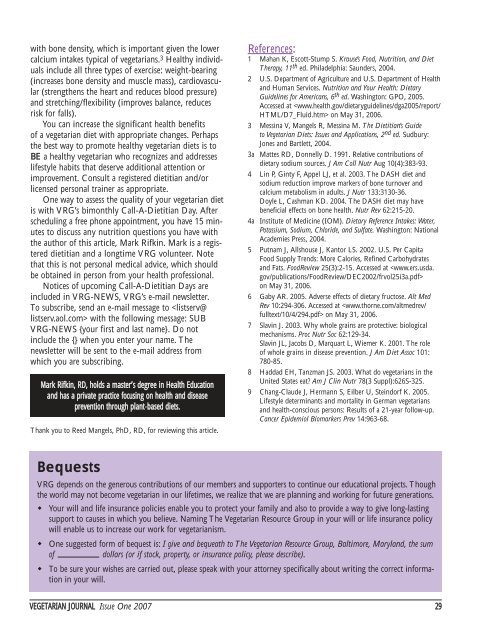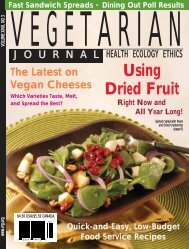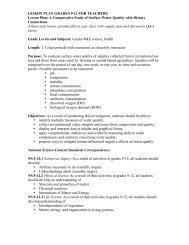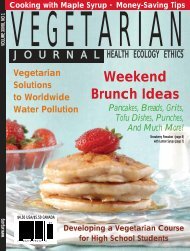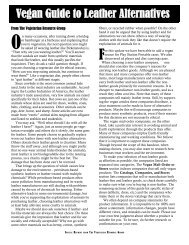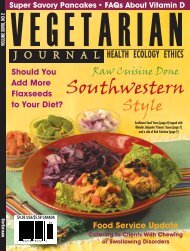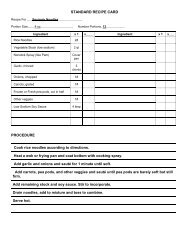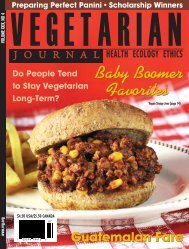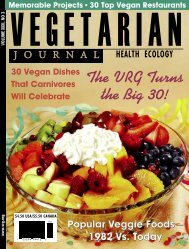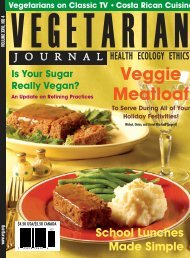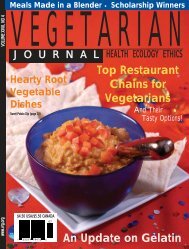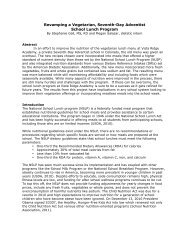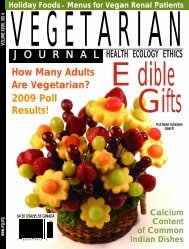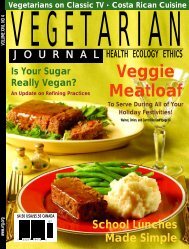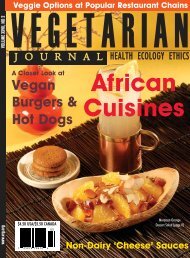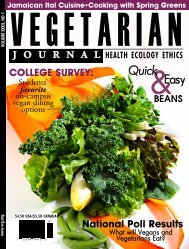Vegan Thickeners - The Vegetarian Resource Group
Vegan Thickeners - The Vegetarian Resource Group
Vegan Thickeners - The Vegetarian Resource Group
You also want an ePaper? Increase the reach of your titles
YUMPU automatically turns print PDFs into web optimized ePapers that Google loves.
with bone density, which is important given the lower<br />
calcium intakes typical of vegetarians. 3 Healthy individuals<br />
include all three types of exercise: weight-bearing<br />
(increases bone density and muscle mass), cardiovascular<br />
(strengthens the heart and reduces blood pressure)<br />
and stretching/flexibility (improves balance, reduces<br />
risk for falls).<br />
You can increase the significant health benefits<br />
of a vegetarian diet with appropriate changes. Perhaps<br />
the best way to promote healthy vegetarian diets is to<br />
BE a healthy vegetarian who recognizes and addresses<br />
lifestyle habits that deserve additional attention or<br />
improvement. Consult a registered dietitian and/or<br />
licensed personal trainer as appropriate.<br />
One way to assess the quality of your vegetarian diet<br />
is with VRG’s bimonthly Call-A-Dietitian Day. After<br />
scheduling a free phone appointment, you have 15 minutes<br />
to discuss any nutrition questions you have with<br />
the author of this article, Mark Rifkin. Mark is a registered<br />
dietitian and a longtime VRG volunteer. Note<br />
that this is not personal medical advice, which should<br />
be obtained in person from your health professional.<br />
Notices of upcoming Call-A-Dietitian Days are<br />
included in VRG-NEWS, VRG’s e-mail newsletter.<br />
To subscribe, send an e-mail message to with the following message: SUB<br />
VRG-NEWS {your first and last name}. Do not<br />
include the {} when you enter your name. <strong>The</strong><br />
newsletter will be sent to the e-mail address from<br />
which you are subscribing.<br />
Mark Rifkin, RD, holds a master’s degree in Health Education<br />
and has a private practice focusing on health and disease<br />
prevention through plant-based diets.<br />
Thank you to Reed Mangels, PhD, RD, for reviewing this article.<br />
References:<br />
1 Mahan K, Escott-Stump S. Krause’s Food, Nutrition, and Diet<br />
<strong>The</strong>rapy, 11 th ed. Philadelphia: Saunders, 2004.<br />
2 U.S. Department of Agriculture and U.S. Department of Health<br />
and Human Services. Nutrition and Your Health: Dietary<br />
Guidelines for Americans, 6 th ed. Washington: GPO, 2005.<br />
Accessed at on May 31, 2006.<br />
3 Messina V, Mangels R, Messina M. <strong>The</strong> Dietitian’s Guide<br />
to <strong>Vegetarian</strong> Diets: Issues and Applications, 2 nd ed. Sudbury:<br />
Jones and Bartlett, 2004.<br />
3a Mattes RD, Donnelly D. 1991. Relative contributions of<br />
dietary sodium sources. J Am Coll Nutr Aug 10(4):383-93.<br />
4 Lin P, Ginty F, Appel LJ, et al. 2003. <strong>The</strong> DASH diet and<br />
sodium reduction improve markers of bone turnover and<br />
calcium metabolism in adults. J Nutr 133:3130-36.<br />
Doyle L, Cashman KD. 2004. <strong>The</strong> DASH diet may have<br />
beneficial effects on bone health. Nutr Rev 62:215-20.<br />
4a Institute of Medicine (IOM). Dietary Reference Intakes: Water,<br />
Potassium, Sodium, Chloride, and Sulfate. Washington: National<br />
Academies Press, 2004.<br />
5 Putnam J, Allshouse J, Kantor LS. 2002. U.S. Per Capita<br />
Food Supply Trends: More Calories, Refined Carbohydrates<br />
and Fats. FoodReview 25(3):2-15. Accessed at <br />
on May 31, 2006.<br />
6 Gaby AR. 2005. Adverse effects of dietary fructose. Alt Med<br />
Rev 10:294-306. Accessed at on May 31, 2006.<br />
7 Slavin J. 2003. Why whole grains are protective: biological<br />
mechanisms. Proc Nutr Soc 62:129-34.<br />
Slavin JL, Jacobs D, Marquart L, Wiemer K. 2001. <strong>The</strong> role<br />
of whole grains in disease prevention. J Am Diet Assoc 101:<br />
780-85.<br />
8 Haddad EH, Tanzman JS. 2003. What do vegetarians in the<br />
United States eat? Am J Clin Nutr 78(3 Suppl):626S-32S.<br />
9 Chang-Claude J, Hermann S, Eilber U, Steindorf K. 2005.<br />
Lifestyle determinants and mortality in German vegetarians<br />
and health-conscious persons: Results of a 21-year follow-up.<br />
Cancer Epidemiol Biomarkers Prev 14:963-68.<br />
Bequests<br />
VRG depends on the generous contributions of our members and supporters to continue our educational projects. Though<br />
the world may not become vegetarian in our lifetimes, we realize that we are planning and working for future generations.<br />
• Your will and life insurance policies enable you to protect your family and also to provide a way to give long-lasting<br />
support to causes in which you believe. Naming <strong>The</strong> <strong>Vegetarian</strong> <strong>Resource</strong> <strong>Group</strong> in your will or life insurance policy<br />
will enable us to increase our work for vegetarianism.<br />
• One suggested form of bequest is: I give and bequeath to <strong>The</strong> <strong>Vegetarian</strong> <strong>Resource</strong> <strong>Group</strong>, Baltimore, Maryland, the sum<br />
of<br />
dollars (or if stock, property, or insurance policy, please describe).<br />
• To be sure your wishes are carried out, please speak with your attorney specifically about writing the correct information<br />
in your will.<br />
VEGETARIAN JOURNAL Issue One 2007 29


